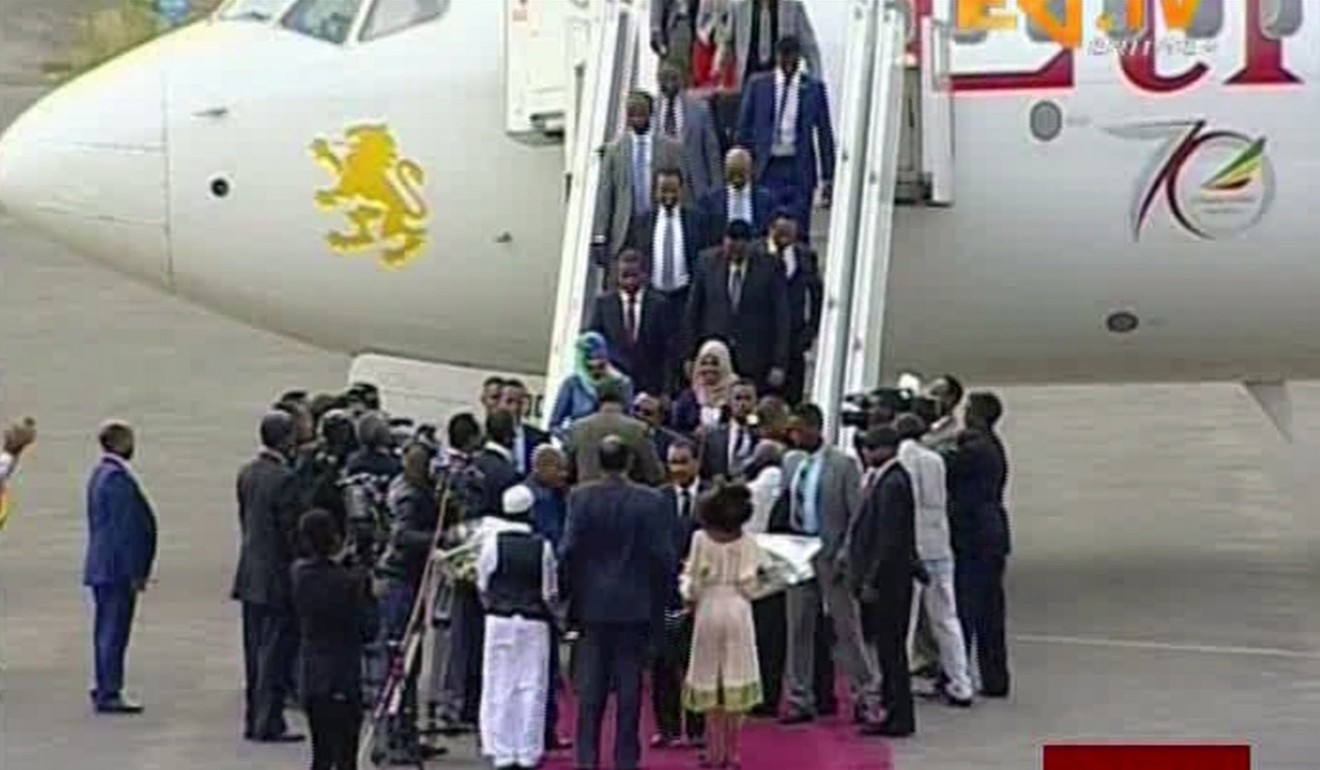Date: Monday, 09 July 2018
|
The announcement came after Ethiopian Prime Minister Abiy Ahmed’s landmark visit to Eritrea for talks with President Isaias Afewerki
www.scmp.com
|
The announcement came after Ethiopian Prime Minister Abiy Ahmed’s landmark visit to Eritrea for talks with President Isaias Afewerki
Quoting from a “Joint Declaration of Peace and Friendship”, Eritrean Information Minister Yemane Gebremeskel said on Twitter the “state of war that existed between the two countries has come to an end. A new era of peace and friendship has been ushered [in].”
The announcement capped weeks of whirlwind change, driven by Ethiopia’s Prime Minister Abiy Ahmed, culminating in his visit to the Eritrean capital for face-to-face talks with President Isaias Afewerki.
“Both countries will work to promote close cooperation in political, economic, social, cultural and security areas,” Yemane added.
He said the agreement was signed by Ethiopian Prime Minister Abiy Ahmed and Eritrean President Isaias Afwerki on Monday morning at state house in Asmara.
Images of the ceremony showed the two men sharing a wooden desk, backed by their nations’ flags, as they simultaneously signed the document.
The declaration echoed comments made by Abiy at a dinner hosted by Isaias late Sunday, where he said diplomatic, trade, transport and communications ties would be re-established and borders reopened.
“We agreed that the airlines will start operating, the ports will be accessible, people can move between the two countries and the embassies will be opened,” Abiy said. “We will demolish the wall and, with love, build a bridge between the two countries.”
The sudden rapprochement will spell an end to a years-long cold war that has hurt both countries.
The Horn of Africa nations have remained at loggerheads since Ethiopia rejected a United Nations ruling and refused to cede to Eritrea land along the countries’ border following a 1998-2000 war that killed 80,000 people.
There was no sign of that animosity on Sunday.
Abiy stepped from an Ethiopian Airlines plane at the airport in Asmara to be greeted by Isaias, the two men embracing before they strode off along a red carpet.
Crowds lined the streets of the Eritrean capital cheering on the leaders’ convoy, waving the twinned flags of Ethiopia and Eritrea.
With Abiy’s comments later in the day, the meeting appeared to have achieved its touted aim of seizing “a spectacular opportunity to decidedly move forward peace for the good of our people,” as Abiy’s chief of staff Fitsum Arega put it earlier.
Eritrea’s information minister, Yemane Gebremeskel, later tweeted a photo of the two leaders huddled in discussion, promising the meeting would, “set the tone for rapid, positive changes on the basis of respect of sovereignty and territorial integrity.”
The re-establishment of diplomatic and trade ties after years of bitter separation could mean big benefits for both nations, and the wider Horn of Africa region, plagued by conflict and poverty.
Once a province of Ethiopia that comprised its entire coastline on the Red Sea, Eritrea voted to leave in 1993 after a decades-long, bloody independence struggle.
The break rendered Ethiopia landlocked, and the deterioration of relations due to the continuing cold war forced Ethiopia to rely on Djibouti for its sea trade.
Ethiopian access to Eritrea’s ports will be an economic boon for both, as well as posing a challenge to the increasing dominance of Djibouti which had benefited from importing and exporting the vast majority of goods to Africa’s second-most populous country.
Free movement across the border will also unite, once again, two peoples closely linked by history, language and ethnicity.
Sunday’s historic visit came after Abiy’s move last month to abide by the 2002 decision from the UN-backed commission aimed at settling Ethiopia and Eritrea’s border dispute, which fuelled the two-year war.
The UN decision awards chunks of land along the border, including the flashpoint town of Badme, to Eritrea.
Ethiopia had rejected the ruling and continues to occupy the town, sparking a heated rivalry between the two countries that has over the years erupted in gunfire.
Both nations have supported rebel groups intent on overthrowing the other’s government and periodically engaged in direct deadly skirmishes along the border.
Eritrea has used the threat of Ethiopian aggression to justify repressive policies, including an indefinite national service programme the UN has likened to slavery.
Abiy took office in April and quickly pursued an ambitious reform agenda that has reversed some of the touchstone policies of the ruling Ethiopian People’s Revolutionary Democratic Front (EPRDF).
He has released prominent dissidents from jail and also announced the partial liberalisation of the economy.
Some have raised concerns that the pace of Abiy’s reforms may upset some party hardliners. Last month a grenade was thrown at a rally the prime minister addressed in the capital Addis Ababa.
Abiy’s decision to honour the boundary ruling began a rapid diplomatic thaw, paving the way for two top Eritrean officials to visit Addis Ababa last month, after which the meeting between the two leaders was announced.
However, Ethiopian troops have yet to withdraw from the disputed territories along the border, and many of the Ethiopian residents of Badme are against ceding their town to Eritrea.
Eritrea breaks away: In 1962 Ethiopia’s last emperor, Haile Selassie, proclaims the annexation of Eritrea, abolishing its autonomous status and effectively making it a province.
Eritrea launches a war for independence that lasts nearly 30 years.
In 1991 Eritrean rebels, who help overthrow the military-Marxist Ethiopian regime of Colonel Mengistu Haile Mariam, seize the Eritrean capital Asmara. They install a government, gaining de facto independence.
Eritrea gains full independence in May 1993, a secession blessed by Addis Ababa.
However the 1,000km border between the neighbours is not properly defined.
War erupts: In May 1998 skirmishes break out after Eritrean forces enter the area around Badme, claiming the town under borders drawn during Italian colonial rule.
Fighting spreads and in June the warring sides carry out air strikes.
The ensuing conflict is marked by trench warfare and large-scale pitched battles, alternating with long periods of calm. Attempts at mediation fail.
Fighting flares anew in May 2000. A fierce bombardment of Eritrea turns the conflict in favour of Ethiopia, while indirect negotiations resume in Algiers.
It allows for the deployment of a UN peacekeeping force in a border buffer zone and calls for the withdrawal of Ethiopian troops from areas inside Eritrea.
An official peace pact signed in December 2000 establishes a Boundary Commission, which sits at the International Court of Arbitration in The Hague, to officially demarcate the disputed frontier. Its ruling is to be “final and binding”.
Border ruling rejected: In April 2002 the commission attributes to Eritrea chunks of land along the border, including the contested town of Badme.
Ethiopia rejects the ruling as “illegal, unjust and irresponsible” and requests an “interpretation, correction and consultation”. The commission refuses.
Ethiopian forces continue to occupy the town. The stand-off delays the physical demarcation of the border in terms of the commission’s ruling.
Tensions rise between the two sides with gunfire, landmines and troop movements near the border.
Stalemate: In May 2006, amid fears of a new all-out war, talks are held in London on resuming the demarcation of the border but fail, the neighbours accusing each other of holding to inflexible positions.
In June Ethiopia claims to have killed more than 110 rebels allegedly sent by Eritrea to destabilise the country, a claim denied by Eritrea.
Meanwhile fears arise that the feuding neighbours may be using Somalia as a proxy battleground.
As the dispute drags on, border regions experience regular attacks and incidents.
Concession, breakthrough: In June 2018 Ethiopia’s new prime minister, Abiy Ahmed, announces his country will abide by the 2002 ruling requiring it to cede territory, including Badme, and withdraw its forces.
Eritrea’s President Isaias Afewerki responds positively and sends a delegation to Addis Ababa to plan for future action.
Talks are announced between the rival leaders and Abiy arrives in Asmara on July 8 for the meeting, cheering crowds lining the streets to welcome him.
At dinner afterwards Abiy announces that the two countries will reopen embassies and borders between them, a major step in normalising ties.